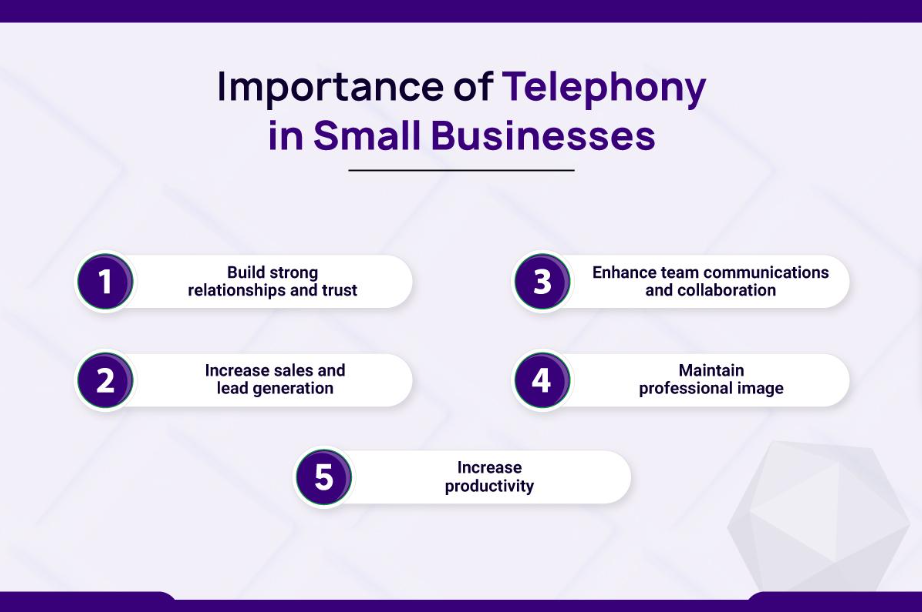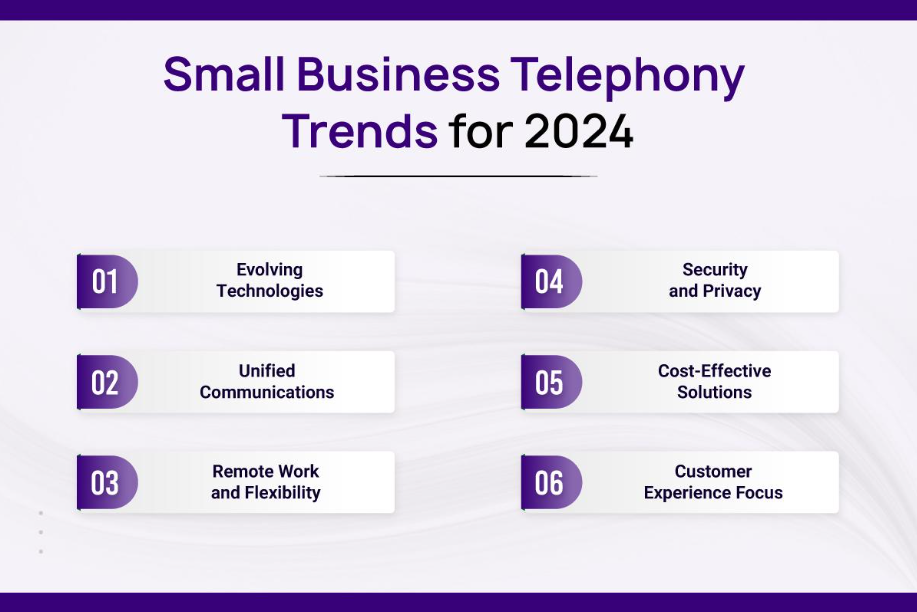Is your business still trapped in old-fashioned dial-tone technology? Effective communication is the key to success for small to large businesses. This boosts how you do work, no matter the size of your company. You need to follow the trending telephony trends to survive in this competitive world.

So, in this blog, we’ll talk about how you can use phone trends as real plans for your business, helping you sell more and make your customers trust you more. All this while not spending too much. Get ready to learn about phone trends for small businesses in 2024.
Definition of Small Business Telephony
The use of voice-based interaction technologies such as the Key Telephone System (KTS) and Private Branch Exchange (PBX) to manage phone calls and others is known as small business telephony. It offers a variety of tools and advanced features according to the specific needs of your business.
The current trend in small business telephony is the use of Voice over Internet Protocol (VoIP). It is a technology that enables businesses to communicate seamlessly by using the internet and collaborating with many tools. It is primarily used by small and medium-sized businesses (SMEs) and other scale businesses.
To handle a telephone service or calls for a small business, you might need a Voicemail, automated voice prompts (IVR), call forwarding, call queuing, and other features that enhance your communication quality.
Importance of Telephony in Small Businesses

Here are some importance of telephony in small businesses:
1. Build strong relationships and trust
Communication is the main factor in building trust with customers. Using phone calls helps to enhance personal connections in real time, which is crucial for businesses to achieve long-term success.
If the customer has any problem, they often want to speak with the agent or customer service representative to get their problem solved. It shows your commitment towards a customer, which significantly builds trust and relationships.
2. Increase sales and lead generation
Effective phone conversations help to close deals with clients. Also, it helps attract a potential customer’s interest in your product or services.
3. Enhance team communications and collaboration
Utilizing a business telephony system, you can effectively communicate clearly and efficiently with a team despite any geographical limitation. With one touch on your screen, you can easily share information, discuss projects, and assign tasks, even for a remote worker. For instance, with the help of telephony apps like KrispCall, you can easily connect with your friends, family, and colleagues despite geographical barriers. It also helps remote or hybrid workers do their job efficiently.
4. Maintain professional image
With a reliable telephony system, businesses can enhance the perceptions of a well-established and credible business in customers’ minds. Features like voicemail, call forwarding, etc, are essential, especially for growing businesses where automated responses and custom greetings help minimize the waiting time and keep customers engaged.
5. Increase productivity
Telephony systems streamline communications and save time and costs. Collaboration of business telephony with different tools and technologies helps you get your work done quickly and make quick decisions using one app.
Small Business Telephony Trends for 2024

Telephony trends in small businesses keep changing. The following are small business telephony trends for 2024:
1. Evolving Technologies
Now, many advanced technologies have made major changes in the whole world. This includes integrations of Artificial intelligence(AI), 5G technology, Internet of Things ( IoT), and others.
Artificial intelligence (AI) is one of the most emerging tools that can be used to enhance business performance. The AI empowers interactive virtual assistants integrated with natural language processing (NPL), which helps you understand and respond to natural language queries, improving the customer experience.
The adaptation of 5G technology has transformed the communications systems in whole sectors. It allows you to have the fastest internet connections, supporting a higher voice quality, video calls, and practical collaboration experience.
Likewise, the Internet of Things (IoT) is a sensor or smart device that can make calls automatically and provide real-time data, which helps to improve customer service and operational efficiency.
2. Unified Communications (UC)
It is an integrated method of communication technologies that helps to make seamless communication by combining various communication methods into a unified platform. The UC is the integration of voice and video communications, which is often delivered through Voice over Internet Protocol (VoIP).
A collaborative platform allows you to have real-time conversations, share files, and conduct virtual meetings, fostering more engaging interactions. Some examples are Slack, Microsoft Teams, and Cisco Webex.
3. Remote Work and Flexibility
Working remotely has become more flexible due to advancements in technology. Technological advancement has also facilitated hybrid work environments, allowing employees to enjoy benefits where they can work from anywhere with an internet connection and accessibility with laptops, smartphones, and so on.
The utilization of collaboration tools and technologies, such as project management tools, virtual whiteboards, video conferencing platforms, etc., can enhance your remote work world to new heights by enabling seamless productivity.
As an example, if you have a team or client across the UK and if you have difficulty in communicating with them using your regular phone then you can get a UK Virtual phone number and connect with them conveniently.
4. Security and Privacy
Another trend in small business telephony is high-level security and privacy. With secure telephony, you can encompass measures to safeguard communication from unauthorized access, wiretapping or interceptions, and other activities. Meanwhile, with high security, you can protect your integrity, confidentiality, and availability of sensitive information.
Also, compliance with data protection regulations such as the General Data Protection Regulation (GDPR) and others is a legal requirement for any organization. It helps to protect customer’s data and control unauthorized sharing of data.
By protecting your apps with regulatory compliance, you can build the customers’ trust, allowing customers to communicate freely with businesses. So, be transparent and accountable about data collection methods and precise privacy policies for individuals to exercise their data rights.
5. Cost-Effective Solutions
Small businesses are also adapting cloud-based telephony and open-source telephony solutions. Cloud-based telephony/VoIP uses broadband for internet connection despite physical infrastructure, long wires, and others, which leads to saving maintenance costs, hardware installations, and so on. Compared to traditional landline systems, cloud-based solutions deliver many offers in monthly subscription fees, flexibility, scalability, security, mobility, and advanced features that are mainly required for your growing business.
Also, using an Open-source telephony solution, you can modify and adapt the system according to your business needs without needing to pay licensing fees. At the same time, you can select any reliable VoIP service provider with a broader audience and reputation in the market.
6. Customer Experience Focus
These days, small businesses focus on providing personalized communications to customers to foster a good customer experience. First, businesses collect and analyze customers’ present purchases and history. Then, they use that information to offer promotions to a targeted audience and deliver personalized greetings.
Small businesses are also using several other techniques to boost customer experience. For instance, they have utilized the power of VoIP systems such as dynamic call routing, Interactive Voice Response(IVR), and so on. Likewise, they have also made provisions to reach out to them via email, chat, and social media. They are also providing a self-service option, so a customer can proactively solve their problem without the help of agents.
Conclusion
In conclusion, effective communication is not just about adopting technology but using it in such a strategic way that it enables small businesses to achieve success. It’s about empowering your team to collaborate seamlessly and engage customers. Hence, by properly integrating and collaborating, your company can be transformed by increasing productivity and providing satisfaction to your valuable customers.
FAQS
Will VoIP replace landlines?
There is a high probability that VoIP will replace landlines. It’s because VoIP is a cost-effective solution, highly scalable and mobile, and has several advanced call management features.
Who developed VoIP?
Many individuals and companies have contributed to the development of VoIP technology, where the key players are John Mauchly (1940s), Vint Cerf, Robert Kahn (1970s), the International Telecommunication Union (ITU), and so on.
What is the future of telephony?
The future of telephony holds an exciting possibility beyond just VoIP. Those future trends include
- Integration with AI and Machine learning
- Integration with IoT and cloud computing
- Effective communication experiences
- Focus on security and privacy



